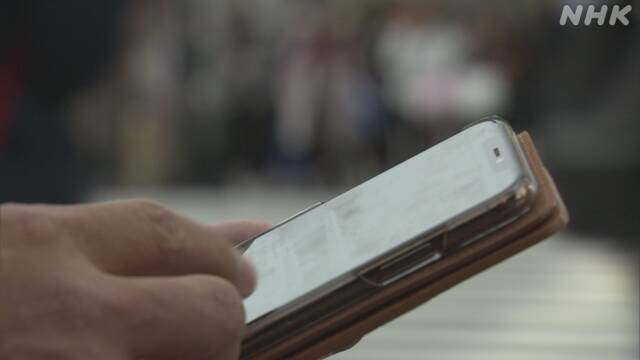About half of smartphone location information "No problem if crisis avoided" Corona survey May 17 18:08
As a measure against the new coronavirus, the use of big data such as smartphone location information is being promoted in Japan. When NHK and LINE conducted a survey on the use of big data, almost half of the respondents answered that "there is no problem if the purpose is to escape the crisis".
At the beginning of this month, NHK conducted a questionnaire on the application in collaboration with LINE, and received responses from 2000 people.
Among these, when asked by multiple answers what they felt about the information on the new coronavirus,
▽ The most common answer was that "it is difficult to identify reliable information" (59%).
And
▽ "Optimistic information is dangerous because it may lead to spread of infection" was 39.1%, and
▽ "Wrong information and hoaxes are spreading" was 38.8%.
As measures against the new coronavirus, governments and local governments in Japan are also using big data such as smartphone location information and search history.
When asked what they think about the use of such data,
▽ "It is no problem if the purpose is to escape the crisis, such as preventing the spread of infection , " was 50.8%, almost half.
On the other hand,
▽ "There is a problem regardless of purpose" was 25.5%.
Looking at the percentage of those who answered “no problem” by age group,
▽ Males were the lowest at 38.4% in their teens, 47.3% in their 20s, 45.7% in their 30s, 61.3% in their 40s, and 58.7 in their 50s. %,
▽ Women were the lowest at 43.8% in their teens, 44.6% in their 20s, 48.8% in their 30s, 50.3% in their 40s, and 52.5% in their 50s, which means that there is no problem as both men and women age The number of people who answered has tended to increase.
In South Korea and other countries, there are efforts such as using personal data to limit the behavior of infected people, but when asked if they could cooperate with the management and restrictions of behavior using personal data,
▽ "I think so very much," "I think so While 61.3% of the respondents answered,
23.7% of the respondents answered “I don't think so” or “I don't think so at all”.
Expert "Is it acceptable to use data for a limited purpose?"
Regarding the results of this survey, Associate Professor Naoya Sekiya of the University of Tokyo, who specializes in social psychology, said, "Generally speaking, when we survey the utilization of personal information, we get a lot of anxiety, but in order to prevent the spread of infection, If you limit the purpose such as ", you can see that many people are allowed to use it."
In addition, "In the case of Japan, there is a great deal of anxiety about the lack of information on infections, which is also a cause of spread of rumor and libel about infected persons. There are many people who think that information should be provided properly after protecting it. "
Providing data daily in a form that protects privacy
In Japan, mobile phone companies and IT companies provide location information on smartphones to governments and local governments, and are used to create measures to prevent the spread of infection.
NTT Docomo and au's KDDI provide data that analyzes the number of people in areas such as urban areas and tourist destinations based on the location information of mobile phones in a form that protects privacy every day. I am.
By comparing it with the data before the spread of infection, it can be used as a guide to how far out of self-restraint is going.
In addition, Yahoo also provides words and location data that users searched on the Internet in a form that does not identify individuals.
Regarding the provision of data, we have an agreement with the country, which includes clearly limiting the purpose of use of data, and the fact that Yahoo can discontinue the provision of data.
Rich contact person app
In an effort to utilize data from smartphones and other devices for the new coronavirus measures, an app that is gaining worldwide attention is an app for understanding people who may have been in heavy contact.
Overseas, it has already been introduced in Singapore and Australia, and is being developed in the United Kingdom and Germany.
In Japan, private IT technicians and others are proceeding with the development by referring to the Singapore application, and the government wants to put it into practical use as soon as possible.
The application uses a communication technology called "Bluetooth" built into the smartphone to record the data on the terminal when users who downloaded the application come close to each other.
And if the user is infected, registering it in the application will automatically notify the person who may have made a heavy contact.
Even if the infected person can't remember their actions, it can quickly provide information to those who may have been in heavy contact, which will help prevent the spread of the infection.
On the other hand, with regard to apps, there is a concern that it will lead to the collection and monitoring of personal information by the government, and there is worldwide debate about how to achieve compatibility with protection of privacy.
For this reason, it is expected that Japanese apps will put in place a mechanism to record who was contacted as anonymous data without using the phone number or location information, with an emphasis on protecting privacy.
If more people do not use the app, it will not lead to an accurate grasp of the infection situation, so it seems that the question will be asked how to spread the understanding.
Broadcast on NHK Special tonight
We will tell you more about infection prevention measures using data in the NHK Special "Fight with new coronavirus big data" from 9 pm on the 17th.

